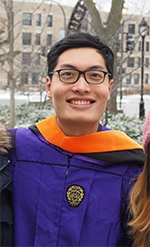Researching Cutting-Edge Technology
Chainatee Tanakulrungson (MSR '18) shares his dream of working with robotics and how Northwestern's Master of Science in Robotics (MSR) program helped him realize that dream.
To accomplish that, he felt he needed more than just a degree in robotics. He wanted to find a program that would give him a chance to learn from his classmates as much as his professors. He also wanted to study somewhere that would give him hands-on training using the applications and techniques he learned about in class.

Today, Tanakulrungson is a robotics software developer at Olis Robotics. He took a few minutes to talk about his experience in the MSR program and how the lessons he learned and the projects he worked on prepared him for the responsibilities he faces today.
What was it about the MSR program that first appealed to you?
I had a mechanical engineering undergraduate degree and a dream to have a career in the robotics industry. I knew I needed to have interconnecting knowledge between mechanical, electrical, and computer engineering. MSR is one of the programs connecting those dots. That is what first appealed about the program to me. Moreover, many classes are project-based, which is important for studying in the technical field so you can understand how to adapt technical concepts into a real-world application.
How would you describe your experience in the program?
It was extremely challenging but energizing to tackle new coursework and projects. We worked with a lot of robotic products, from making a programmed 3D-printed autonomous car to exploring the mysterious world of machine learning. With a moderate student body size, we were often in our lab working on homework and projects together (we called it Thinktank session). I liked that a lot because I think conversing with friends is a great way to learn from others. Apart from exciting projects, we had a great program advisor who was ready to give advice and push us to be a better roboticist. He was also open to proposals for getting new technologies in our lab to support our study and projects.
What were one or two of your favorite projects that you worked on in MSR?
Two of my favorite projects were the robotic catching project and
For the other project, two classmates and I created a
What were the most important lessons you learned during your time in the program?
I learned that robotic manipulation is the foundation of robot movement control. It is not as easy to control a robot arm as it looks. Making it possible for the robot to move each joint necessary to achieve a goal is complex. Also, my experience doing projects with code made me realize how important it is to write clean, clear and readable code for teammates and myself because it is important for others to understand the intention of the code. This also makes it easier to debug later on. It is easy to take some codes from the internet and make thing works, but without a true understanding of why the code does what it does, multiple problems might come up later, and it will be harder to find where the problem is.
As far as life lessons, I learned that before working on any project, realizing your goals and working on high-level planning is essential. As a group, everybody needs to know which part of a jigsaw puzzle they are. The plan should be clearly understood by everyone. Team communication and progress updates are necessary to make sure everybody is on the same page. A friend in our program who is a great coder always encouraged me to do "one thing at a time" and "never give up," which are phrases that I still tell myself today.
What are you doing professionally today?
I am working as a robotic software developer at Olis Robotics (formerly Bluhaptics) in Seattle, Wash. We are a startup making
How did MSR prepare you for your current job?
To work with a robot, you have to blend experiences and knowledge from a number of different fields. MSR prepared me with enough basic knowledge in those fields to analyze and determine what resources I need to solve specific problems.
MSR provided abundant resources to facilitate learning. Every student did a hands-on project with Baxter, a collaborative research robot, during our first quarter. It was great to familiarize ourselves with the real robot. Our lab was also equipped with many electrical and mechanical hardware and rapid-prototyping machines. We could quickly fabricate our idea into a concrete proof-of-concept. We also had access to the Ford Design Center for bigger prototyping machines. In addition, NU has 'The Garage,' which is a workspace for student startups. I remember going there to hear industry speakers and startup pitches.
Is there anything else you'd like to add?
For those of you who have a vision of being an explorer in a robotic industry, whether your interest is machine learning, embedded system design or something else, based on my experience, MSR can make that vision come true. With a variety of technical and design classes, a group of students from many backgrounds, an abundance of resources and opportunities to get your hands dirty with real-world projects, MSR can be a great kick-start to reaching your dream. This is proved by many of us who are now working in the industry. Thanks to MSR, I have a chance to be a part of this industry researching cutting-edge technology for the future.

